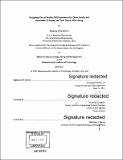Designing Virtual Reality (VR) experience for older adults and determine its impact on their overall well-being
Author(s)
Lin, Xueyang (Xueyang Charles)
DownloadFull printable version (9.748Mb)
Alternative title
Designing Virtual Reality experience for older adults and determine its impact on their overall well-being
Designing VR experience for older adults and determine its impact on their overall well-being
Other Contributors
System Design and Management Program.
Advisor
Joseph F. Coughlin.
Terms of use
Metadata
Show full item recordAbstract
The United States is experiencing a significant growth of the older population. As people age, they are more likely to experience decrease in social activities, limitations in cognitive capabilities, and more symptoms indicative of depression. Among older adults that live in long-term care communities, more than a quarter develop some form of dementia or depression. Virtual Reality (VR) is believed to be beneficial to the older adults due to its immersive interaction capabilities. This thesis seeks to understand how virtual reality as a technology will impact older adults' emotional and social well-being. Human-centered design process was applied to develop the Rendever VR platform. Following the development of the system, a field study was carried out with sixty-three residents from four assisted living communities. The field study was conducted over two weeks, during which residents interacted with one of two intervention conditions - VR (i.e. experiment condition) or TV (i.e. control condition). Questionnaires were filled out by participants prior to and after the intervention for comparison. The results have shown that VR provided more positive outcomes than the control group that used a TV showing the same content. Results suggest that VR has the potential to improve older adults' well-being in general.
Description
Thesis: S.M. in Engineering and Management, Massachusetts Institute of Technology, System Design and Management Program, 2017. Cataloged from PDF version of thesis. Includes bibliographical references (pages 59-60).
Date issued
2017Department
Massachusetts Institute of Technology. Engineering and Management Program; System Design and Management Program.; Massachusetts Institute of Technology. Integrated Design and Management ProgramPublisher
Massachusetts Institute of Technology
Keywords
Engineering and Management Program., Integrated Design and Management Program., System Design and Management Program.